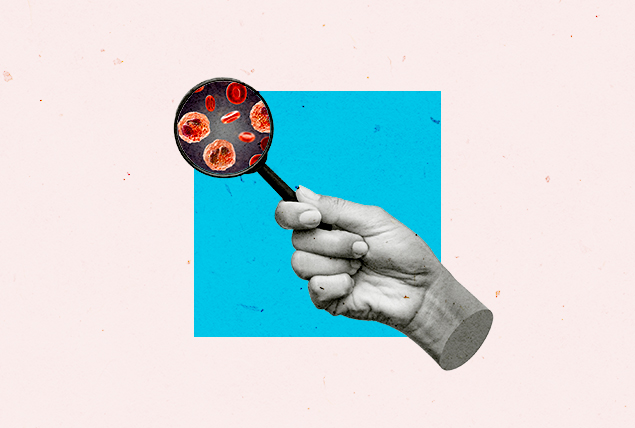How to Live and Date With an Autoimmune Disorder

A well-functioning immune system safeguards the body by attacking and destroying harmful invaders such as germs, bacteria and viruses and facilitating healing and recovery. Sometimes, however, the immune system mistakes healthy cells for foreign intruders. This condition, known as autoimmunity, produces a broad range of effects and symptoms that can pervade many facets of health and living, including sex and relationships.
More than 100 known types of autoimmune disorders affect various body parts and systems. These illnesses, which include type 1 diabetes, rheumatoid arthritis (RA), inflammatory bowel disease (IBD) and multiple sclerosis (MS), are chronic and incurable.
About 25 percent of people with autoimmunity develop more than one autoimmune disorder, and ailments such as fibromyalgia, chronic fatigue, depression, anxiety and insomnia frequently co-occur.
Living with one or more of these diseases can be overwhelming, exhausting and isolating, but it is possible to live a fulfilling and otherwise healthful life with autoimmunity. Making certain lifestyle adjustments and forming a solid support network can help.
Living with an autoimmune disorder
Autoimmune disease symptoms vary considerably depending on what part of the body is affected and the condition's severity. Many people with autoimmunity experience multiple symptoms, such as gastrointestinal issues, pain, fatigue, nausea, dizziness and headaches, that can substantially impact their well-being.
Autoimmune conditions such as MS and RA can impose mobility limitations. Disorders such as anxiety, depression and fibromyalgia can compound challenges and inhibit a person's ability to work, attend school or socialize.
Mobility impediments
Even activities of daily living, including chores and self-care, can be difficult for people with autoimmune conditions, especially those with restricted mobility.
Autoimmunity's unpredictability can be another impediment, according to Gabrielle Morse, L.M.H.C., a psychotherapist based in New York City who also has ulcerative colitis, a form of IBD.
Planning for flare-ups
"There are a number of difficulties that one encounters on a daily basis of which others may not be aware. Those living with autoimmune diseases may be following a medication regime, factoring in medical appointments, and need to rearrange plans for the day if disease flares up," Morse wrote in an email interview.
"For those with IBD, for example, patients may be considering how certain foods, drinks or social activities may prompt or exacerbate symptoms and need to ensure access to a bathroom. Autoimmune disorders can impact someone physically, mentally and emotionally," she added.
Symptoms can fluctuate
Autoimmune-related chemical fluctuations within the body can cause subsequent changes in symptoms, sometimes without warning, noted Jill Carnahan, M.D., the medical director of Flatiron Functional Medicine in Boulder, Colorado.
"Symptoms may ebb and flow with patients feeling good one day and very poorly the next day," Carnahan said.
Stress, lack of sleep, sun and high temperatures are some of the most common triggers for flare-ups, according to Kuljit Kapur, D.O., the chief medical officer at Harter Investment Strategies in Naperville, Illinois.
Extra precautions
Various other factors can influence symptoms, and people with autoimmunity may need to take extra precautions to minimize challenges.
COVID-19 continues to present distinct hurdles for people with autoimmunity, even though most restrictions have been lifted, Morse said.
"Those living with autoimmune disorders, specifically, those taking immunosuppressant drugs, are at higher risk and, therefore, still require more precautions. This may prove difficult for others to understand or accept, leaving patients feeling misunderstood," she said.
Others may find that symptoms interfere with the ability to stay involved or show up to a social activity. Explaining absences and sharing details with peers can be uncomfortable and difficult.
"Autoimmune disorders may make patients feel isolated and alone in the experience," Morse said.
Dating with an autoimmune disorder
Dating can be complicated for anyone, but it may be particularly difficult for people with autoimmunity.
"Limitations stemming from autoimmune disease symptoms can extend to the bedroom and take a toll on romantic relationships," Kapur wrote in an email.
The thought of going on a date can be uncomfortable, even scary, given the unpredictability of diseases and the constant threat of a flare-up, Morse said. Some standard date ideas—grabbing a drink or meal or taking a hike—may not work for people with autoimmunity.
"Dating someone new and adding a chronic illness to the picture adds an additional layer of vulnerability," Morse said.
Beyond the getting-to-know-each-other stage
This feeling of increased vulnerability can persist well into the relationship, she continued.
"I've worked with many people living with autoimmune disorders, and it has impacted their self-image. They fear being perceived as broken or weak," Morse said, adding that many people fear their partner or potential partner will leave when they learn about the disease.
Even with an understanding and supportive partner, Kapur said, it's understandable that a person may feel frustrated by pain, fatigue and other symptoms that inhibit a physical connection. Relationships also can be impacted by the following effects of autoimmune diseases:
- Stress
- Low self-esteem
- Depression
- Anxiety
- Other psychological effects
"For example, you don't feel good physically, and it's hard to pin down the solutions that could alleviate your symptoms. You feel frustrated, on edge, insecure and unworthy. You're not alone," Kapur said. "It makes sense that relationships can be challenged when navigating autoimmune disease. These emotions, of course, play out in how we connect with our loved ones."
The importance of support
Talking to friends and family, working with a therapist or counselor, and participating in autoimmunity support groups can alleviate some of this emotional turmoil and improve a person's self-confidence. Choosing an empathetic, respectful and patient partner can do wonders.
"Those with autoimmune diseases will benefit from surrounding themselves with people or a partner who has the capacity to empathize and lean in with a curiosity," Morse said. "It can feel draining, defeating, exhausting and many other things. So the feeling of somebody holding your hand tightly through a difficult day can go a very long way."
As for when and how to disclose your illness to a new partner, Kapur recommended talking about it as soon as possible.
"Transparent communication will only set you up for success with your new partner," she said. "The right partner will be accepting and willing to work with you and learn to understand your needs and feel comfortable discussing their own as you strengthen your relationship over time."
Kapur suggested keeping that line of communication open and talking to your partner regularly and honestly about your physical and emotional bandwidth. At the same time, she noted, it's equally important to ask your partner what they need from you.
"Successful couples are consistently giving and taking; exploring each other and going back and forth between the other's needs and wants," she explained. "When you have the energy, ask new questions to learn current information: How are they doing? How are they handling the current situation? Discovering something new about your partner can enhance intimacy by giving them the spotlight."
Autoimmunity prevention and aftercare
There is no surefire way to prevent autoimmunity, in part, because scientists are still uncertain about what causes autoimmunity, though most implicate genetic, hormonal and environmental factors.
Other risk factors associated with autoimmunity, according to Cleveland Clinic, include:
- Smoking
- Infection
- A family history of autoimmunity
- Certain medications
Being female also increases a person's risk. Approximately 50 million people in the United States have autoimmunity, according to the American Autoimmune Related Diseases Association (AARDA). About 75 percent of those people are female, and most are of reproductive age.
It isn't always possible to stave off symptoms or flare-ups, either. In addition to medications and other medical interventions, certain lifestyle changes can reduce the risk, according to experts.
"One of the best lifestyle changes is simply not adding to that immune system trigger by introducing triggers that are within your control—the modifiable risk factors," wrote Mahmud Kara, M.D., founder and CEO of KaraMD, a supplements manufacturer in Cleveland, in an email. "For example, avoiding foods that are inflammatory, like alcohol, trans fats, artificial sugars, etcetera, can be helpful. Increasing your physical activity each day can actually help reduce inflammation that may be worsening symptoms associated with autoimmune disorders."
Other lifestyle changes to consider include avoiding ultra-processed foods, using nontoxic products and minimizing stress, Kara added. As for the latter, research suggests practices such as meditation, yoga and deep breathing can be helpful.
Supporting someone with autoimmunity
One of the best ways to support someone with autoimmunity is to learn about their specific condition and create a caring, safe and nonjudgmental environment for them, sources for this report said.
"Learn, don't assume. Acknowledge your own biases and limited knowledge on the topic and try to learn more about how the illness is affecting this person. Empathize and sit in the feelings with them rather than trying to give advice," Morse said.
For example, comments such as "Why don't you do X differently?" or "Look on the bright side" may be well-intentioned, but they indicate discomfort and a lack of empathy, she said.
"Be understanding and give them grace, meaning do not hold them to a prior standard. Recognize that they may not be able to show up as they used to," Morse continued. "Check in and offer help. Don't avoid reaching out. And remember, just because you can't see it doesn't mean it's not there. Many people have learned to live with their pain."
Kapur recommended caregivers stay attuned to their own needs as well, as this is crucial to avoid issues such as compassion fatigue, resentment or burnout.
"If you, as a caregiver, are struggling, seek out support from a professional. It's so important to bridge the gap in understanding," she said. "We often wait way too long before we ask for professional help. Get help early and don't feel like a failure for asking for support."
Resources for patients and caregivers
Whether you are living with an autoimmune disease or know someone who is, Morse recommended seeking a local or online support group for people in your circumstance.
"I'd also recommend educating yourself on the illness through reputable sources and reading about success stories of people who have been treating and managing their illness," Morse said. "Sometimes we have stigmas or only hear the tragic stories, and it is important to unlearn some of this and expand our knowledge."
Several national and international organizations specialize in autoimmunity and specific autoimmune disorders, including:
- Global Autoimmune Institute
- Autoimmune Association
- National Multiple Sclerosis Society
- Arthritis Foundation
- Lupus Foundation of America
All of these entities provide links to resources, including support groups, healthcare providers and medically accurate educational content that can inform and empower patients and their caregivers and loved ones. If you're unsure where to turn for information on your particular condition, consider asking your healthcare provider for recommendations.


















